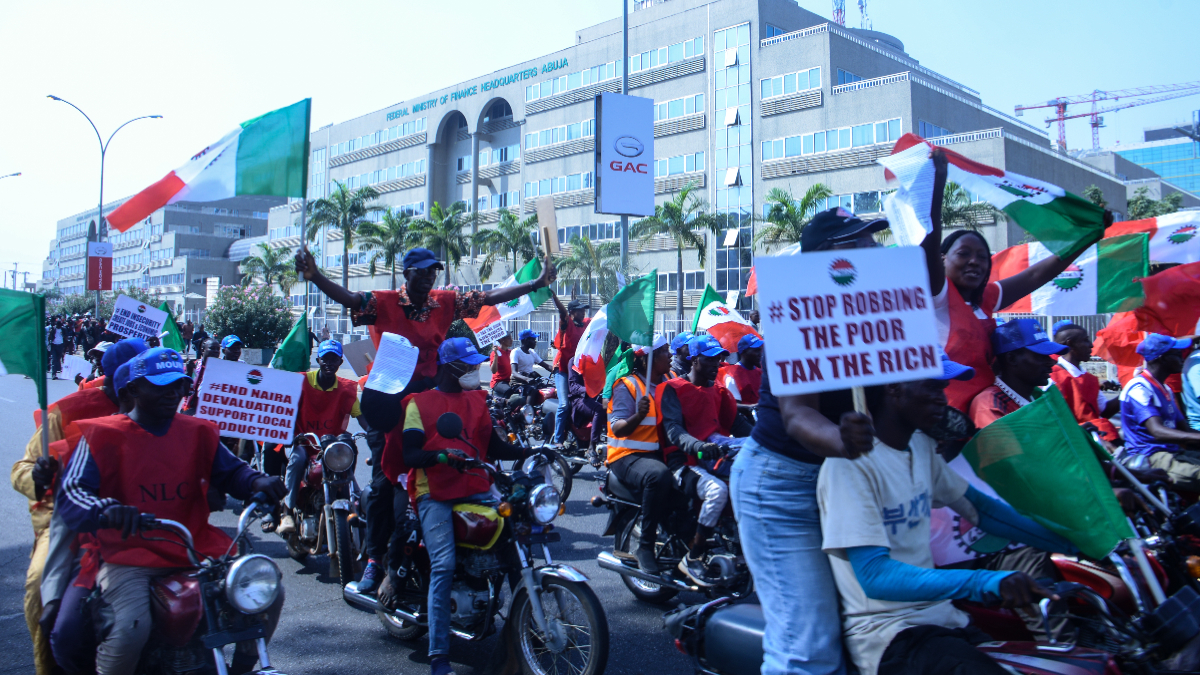5 possible things to expect during August 1 nationwide protest

As Nigeria braces for the August 1 protest, these potential outcomes highlight the widespread impact such a movement can have on everyday life.
As the August 1 protest against President Bola Tinubu's government approaches, various scenarios are anticipated that could impact daily life across Nigeria.
The protest, driven by grievances over economic hardship and rising living costs, will likely see widespread participation.
Here are five possible outcomes to prepare for:
1. Poor Banking Network
![People queue outside a bank in Lagos on February 22, 2023 during the cash crunch saga. [Getty Images]](https://ocdn.eu/pulscms/MDA_/c95f4fc6dc721c155f50c5ed29deae15.jpg)
One of the immediate effects of large-scale protests is disruption to essential services, including banking.
During previous protests, banks have shut down operations to ensure the safety of their staff and assets.
On August 1, banking networks may become unreliable or inaccessible, as many financial institutions might close branches in anticipation of unrest.
This could affect transactions, ATM withdrawals, and other banking services, leaving people unable to access their funds.
READ ALSO: Court restricts protesters' gathering in Lagos to Freedom, Peace Park
2. Poor Internet and Call Network
![A Member of the Revolution Now protesters reacts to a live streaming phone in Lagos Nigeria while demanding for better governance for the present administration, during a protest in Lagos Nigeria to mark the 60th Independence Day anniversary on October 1, 2020. [Getty Images]](https://ocdn.eu/pulscms/MDA_/05fb2f34c4f52399d53692e636a01f26.jpg)
In times of civil unrest, telecommunication networks often experience overloads or deliberate shutdowns by authorities aiming to control the flow of information.
On August 1, Nigerians might face poor internet connectivity and disruptions in call services.
The government could limit social media activity to prevent the spread of protest information and coordination efforts.
This will likely hinder communication, making it challenging for people to stay informed or reach out to loved ones.
3. Fuel Scarcity
![People stands to buy fuel with jerry cans at a filling station in Lagos, on December 1, 2015. [Getty Images]](https://ocdn.eu/pulscms/MDA_/98b0fa70a090ed8a151c0004136da653.jpg)
Protests often disrupt supply chains, and the August 1 protest is expected to be no different. Fuel scarcity could become a significant issue, as roadblocks and safety concerns may hinder fuel transportation.
Long queues at petrol stations might become a common sight, with motorists scrambling to secure fuel supplies.
This shortage can also impact public transportation, exacerbating commuting difficulties.
4. Tight Security
![Security Forces on patrol in Lagos. [Getty Images]](https://ocdn.eu/pulscms/MDA_/87498d3a424c4bcc695eb552f4d660e3.jpg)
In anticipation of the protests, the government will likely deploy a heavy security presence to maintain order.
This means that cities could see an increase in police and military personnel on the streets, potentially leading to confrontations with protesters.
Security checkpoints, roadblocks, and increased patrols might be set up, contributing to a tense atmosphere and possible clashes.
READ ALSO: 5 historical protests that shook Nigeria
5. Gridlock
![Gridlock at Ojodu Berger. [Getty Images]](https://ocdn.eu/pulscms/MDA_/64bd48653e7fa4ea41ec8538a06d9a9d.jpg)
Numerous protestors are expected to take to the streets, so major cities, particularly in protest hotspots like Lagos and Abuja, could experience severe traffic congestion.
Protesters or security forces might block roads, causing significant delays and making it difficult for people to commute.
Those who need to travel on August 1 should anticipate gridlock and plan their journeys accordingly, allowing for extra time or avoiding travel.
ridoola.blogspot.com.ng
Comments
Post a Comment